Automobile and Parts
Smart Meihekou (Autonomous Vehicle) Project of Meihekou City
1 Introduction to the Project
1.1 Project background
1.1.1 Product introduction
The smart city autonomous vehicle refers to a new generation of vehicle that realizes intelligent information exchange and sharing between the vehicle and the surrounding environment (people, vehicle, road, cloud, etc.) by integrating modern communication and network technology through on-board sensors, controllers, actuators and other devices, and has the functions of complex environment perception, intelligent decision-making and collaborative control. This vehicle is capable of autonomously completing driving tasks without the need for human intervention. Through advanced algorithms and machine learning capabilities, it can navigate effectively in complex urban environments.
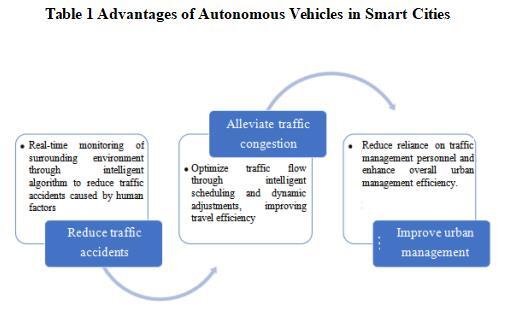
The construction site of the project in Meihekou City, leveraging the Meihekou Comprehensive Tourism City to build intelligent road testing facilities, a city-level operation control platform, an autonomous vehicle traffic system, and a service platform.
1.1.2 Market prospect
(1) Smart City Market Size
The development of smart city is deeply integrated with next-generation information technologies such as 5G, the Internet of Things (IoT), Artificial Intelligence (AI), big data, and blockchain. These technologies provide powerful data support and intelligent services for smart cities, driving the comprehensive upgrade of urban management and services. For example, by integrating various urban data resources and utilizing big data analysis and artificial intelligence technology, the smart city will achieve more precise decision-making support and more efficient urban management. At the same time, with the popularization of Internet of Things technology, the number of Internet of Things devices in smart cities is increasing at an astonishing speed, which provides powerful support for intelligent management of cities.
In recent years, governments at all levels in China have continuously promoted the construction of smart city, attracted a large amount of social capital, and accelerate investment, directly driving the large-scale development of the smart city industry. Data shows that in 2023, the smart city market in China reached a scale of 28.6 trillion yuan, growing by 17.7% year-on-year. By 2024, the market size of China's smart city sector is reached about 33 trillion yuan.
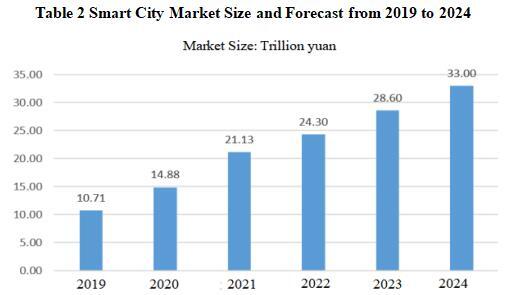
In 2023, the market size of Chinese smart city artificial intelligence platform reached 5.7 billion yuan. And in 2024, the market size of Chinese smart city artificial intelligence platform reached above 6.0 billion yuan. With the rise of large models and generative AI, the market size of smart city artificial intelligence platforms is expected to return to a growth trend.
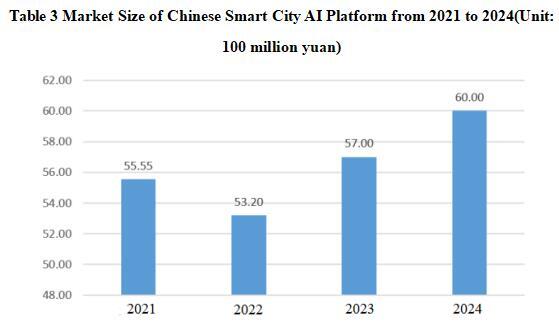
(3) Market size of intelligent connected vehicle
With the rapid development of the new generation of information technology such as artificial intelligence, 5G, big data, etc., the intelligent connected vehicle is showing a strong development momentum and becomes the strategic high ground that global automotive companies are vying to occupy. Data shows that the global smart vehicle market has a sales volume of approximately 100 million vehicles, with a 10% penetration rate for autonomous vehicle driving. The average price of each smart vehicle is 160,000 yuan, making the smart vehicle market size approximately 1 trillion yuan. In addition, according to estimates by the Boston Consulting Group in the United States, the market value created by autonomous vehicles will reach 42 billion US dollars. By 2035, 18 million cars globally will have partial autonomous driving functions, 12 million cars will become fully autonomous vehicles, and China will be the largest smart vehicle market.
In 2023, the market size of China's intelligent connected vehicle industry reached 161.3 billion yuan, with a year-on-year growth of 21.56%. With the breakthrough of key technologies, such as the deployment of C-V2X Internet of Vehicles (IoV) technology, the penetration rate of smart connected vehicles in China is expected to continue increasing. By 2025, the market size of China's intelligent connected vehicle industry is projected to reach 222.3 billion yuan.
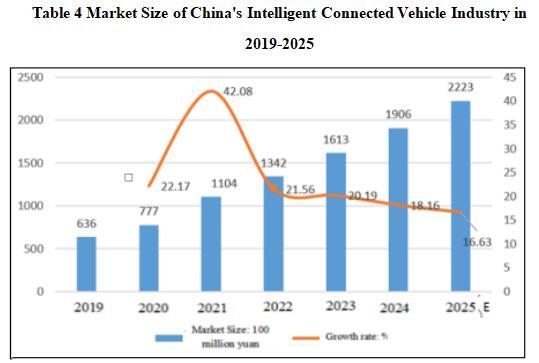
(4) Market Prospect for Intelligent Connected Vehicles in Smart Cities and Integrated Vehicle-Road-Cloud Systems
The rapid development of Internet of Things, cloud computing and other technological fields has laid a solid foundation for the construction of smart cities in China. The Chinese government attaches great importance to the construction of smart cities. According to IDC forecast, by 2027, China's smart city ICT market investment scale will exceed 1.1 trillion yuan. With a compound annual growth rate (CAGR) of 8%, the market size for China's smart cities is expected to surpass 1.3 trillion yuan by 2029.
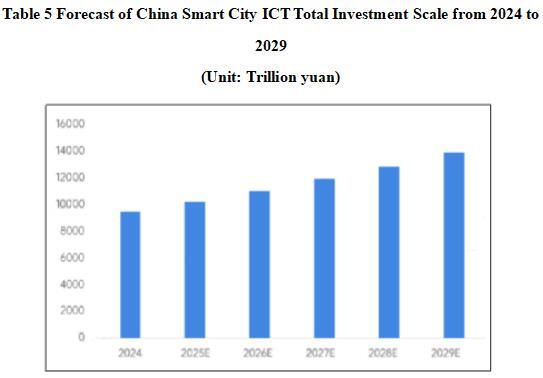
With the development of intelligent technology, more and more automobile enterprises believe that the future traveling will not be individual and isolated, but will rely on a fully interconnected intelligent transportation network to enhance overall traveling efficiency and safety.
In recent years, the acceleration of the commercialization of intelligent transportation systems has become a topic of market attention. On July 3, the Ministry of Industry and Information Technology, the Ministry of Public Security and other three Departments announced the first batch of 20 pilot cities for “Vehicle-Road-Cloud Integration” applications, marking the shift of V2X technology from localized testing to large-scale application. Among them, cities like Beijing, Shanghai, and Guangzhou have announced full-area openings within certain regions.
Currently, there are 17 national-level intelligent and connected vehicle testing zones, 7 Internet of Vehicles (IoV) pilot zones, and 16 “dual-intelligence” pilot cities across the country. Over 32,000 kilometers of testing roads have been opened, more than 7,700 testing licenses have been issued, and over 120 million kilometers have been driven in tests. The deployment of intelligent roadside units (RSUs) exceeds 8,700 sets, and cloud control platform construction is underway in multiple regions.
In recent years, with the continuous progress of science and technology and the continuous promotion of policies, China's intelligent connected vehicle industry is accelerating into the fast lane of development at an unprecedented pace. Currently, national-level intelligent connected vehicle test demonstration zones have been built in many places to accelerate the commercial application process of intelligent connected vehicles.
According to the report “Forecast of the Incremental Production Value of the ‘Vehicle-Road-Cloud Integration’ Smart Connected Vehicle Industry” published by the China Society of Automotive Engineers and other organizations, it is expected that by 2025, the incremental production value of the “vehicle-road-cloud integration” smart connected vehicle industry will reach 729.5 billion yuan. By 2030, it is anticipated to exceed 2.5825 trillion yuan, with a compound annual growth rate of 28.8%, which includes the incremental production value of smart connected vehicles, intelligent road testing infrastructure, cloud control platforms, and others.
In summary, the project has a promising market prospect.
1.1.3 Technical analysis
Based on the new generation of information technologies such as 5G, big data, cloud computing and Internet of Things, the intelligent application platforms cover a wide range of areas, including “intelligent business,” “intelligent security,” “smart living,” “smart management,” and “smart services.”
The autonomous driving intelligent traveling service platform is composed of an “1+2+N” application structure. “1” refers to the ride-hailing service platform, which is the core hub of the autonomous ride-hailing product, providing comprehensive information services and platform management for the ride-hailing app. “2” refers to the iOS and Android dual-end apps, offering public services such as autonomous vehicle reservation for private cars, commuting, station inquiries, real-time vehicle location, and nearby convenience information. “N” refers to open interfaces that can connect to cloud control management platforms and third-party application platforms, enabling real-time data interaction between software and vehicles, thus increasing the commercial value of autonomous vehicle ride-hailing services. This provides strong support for autonomous vehicle operation, promote the marketization of autonomous technology application, and bridges the “last mile” of urban traveling.
1.1.4 Advantageous conditions of project construction
(1) Policy advantages
The Chinese government attaches great importance to the development of intelligent connected vehicles and promotes the process of technological innovation and industrialization in this field through a series of policies and plans. Policy documents such as “Made in China 2025”, “Outline for Building China's Strength in Transport”, “Next Generation Artificial Intelligence Development Plan” and other policy documents have planned the development direction and target of intelligent connected vehicles. In addition, the government has also provided strong support for the development of intelligent connected vehicles by setting up pilot projects and improving laws and regulations and standard systems.
In order to thoroughly implement the strategic deployment of the Party Central Committee and the State Council on the construction of digital China, the State Data Bureau issued the “Guiding Opinions on Deepening the Development of Smart Cities and Promoting the Comprehensive Digital Transformation of Cities”, which aims to promote the comprehensive digital transformation of cities through data integration and utilization, in order to better serve the high-quality development, efficient governance, and high-quality living in urban areas. This will, in turn, support the development of new types of productive forces and advance the construction of modern Chinese cities. At the same time, it is suggested that by 2027, the digital transformation of the whole city will achieve remarkable results, forming a group of livable, resilient and smart cities, which will strongly support the construction of digital China. By 2030, the nationwide digital transformation of urban areas will achieve a comprehensive breakthrough. The public's sense of gain, happiness, and security will be greatly enhanced, and a group of globally competitive cities with Chinese-style modernization will emerge.
In November 2023, the Ministry of Industry and Information Technology, the Ministry of Public Security and other two Departments jointly issued the “Notice on Carrying out the Pilot Work of Intelligent Connected Vehicle Access and Road Access”, and deployed and carried out the pilot work of intelligent connected vehicle access and road access; In December 2023, the Ministry of Transport issued the “Guideline for Public Road Trials of Autonomous Vehicles (Trial), ” guiding the standardization of autonomous driving technology applications in the transportation service sector. In January 2024, the Ministry of Industry and Information Technology, the Ministry of Public Security and other three Departments issued the “Notice on Carrying out the Pilot Work of ‘Vehicle-Road-Cloud Integration’ Application of Intelligent Connected Vehicles”, further promoting the commercialization of intelligent and connected vehicles. In June 2024, the Ministry of Industry and Information Technology and other three Departments announced a list of 9 joint entities, consisting of automotive manufacturers and end users, officially entering the pilot program for intelligent and connected vehicle access and road access. On July 3, 2024, the Ministry of Industry and Information Technology and other four Departments jointly issued the “Notice on Announcing the List of Pilot Cities for the Integrated Application of Intelligent Connected Vehicles and the ‘Vehicle-Road-Cloud Integration’,” officially designating 20 cities (or city alliances) as the first batch of pilot areas for the application of intelligent connected vehicles “vehicle-road-cloud integration.” This measure marks an important step in the field of intelligent connected vehicles in China and indicates a profound change in travel mode in the future.
(2) Industrial Foundation
On October 30, 2019, the Meihekou City Government's Information Resources Sharing Platform was officially launched. This marked a solid step forward for Meihekou City in breaking down Government's information silos, building an integrated service platform, and accelerating the construction of a new smart city.
In 2024, Meihekou City was successfully approved as a special pilot project for the construction of a national green and low-carbon transportation system, specifically the “County-level Model” for green and low-carbon transportation. The pilot will be conducted in six areas: green travel, promotion and application of new energy and clean energy transportation equipment, construction of public transportation charging and swapping infrastructure, energy-saving and carbon-reducing measures for passenger and freight transportation hubs, resource-saving and intensive use of highway infrastructure, and integrated transportation informatization.
(3) Talent advantages
Meihekou City attracts and introduces high-quality talents through various ways. Meihekou City Government has launched the “Meihekou Talent Introduction Program”, giving priority to the introduction of high-tech talents, including computer scientists, engineers, researchers, etc., to promote scientific and technological innovation and industrial upgrading. In addition, Meihekou City also attracts excellent entrepreneurs and startups, by offering financial support, venue assistance, tax reductions, and other preferential policies to create a favorable environment and conditions for their businesses.
Meihekou City also has significant advantages in higher education and scientific research. Meihekou City and colleges and universities have established a joint unit to provide scientific and technological services, achievement transformation and skill training, providing a solid talent foundation for local economic development.
(4) Transportation advantages
Meihekou City is a regional central city in the southeast of Jilin Province, an important transportation hub and commercial port town in the northeast region, and an important node city in the central urban agglomeration of Jilin Province. In April 2023, the General Office of the Meihekou City People's Government issued the “Implementation Opinions on Accelerating the Integration of Urban and Rural Transportation Development”, proposing: Promote the construction of urban and rural expressways. Improve the highway transportation network and build a highway network with expressways as the framework, national and provincial trunk highways as the support and rural branch highways as the basis, so as to form a half-hour traffic circle with higher quality. Support the development of “All-region Tourism” in Meihekou City with rural road construction services, promoting the connection between various scenic areas, key rural tourism zones, and the integrated transportation network system. Accelerate the connection between expressways, national and provincial trunk roads, and key areas. By constructing tourist roads and improving other transportation infrastructure, enhance the urban-rural transportation network. New and renovated road sections provide access to rural tourism scenic areas, achieving the integration of urban-rural passenger transport services with tourism infrastructure, thus providing a foundation for the integrated development of transportation and tourism. Lay a solid foundation for the completion of the project.
1.2 Contents and scale of project construction
Relying on Meihekou All-region Tourism City, construct intelligent road testing facilities, city-level operation and control platform, unmanned vehicle transportation system and service platform, etc.
1.3 Total investment of the project and capital raising
1.3.1 Total investment of the project
The total investment of the Project is 350 million yuan, including construction investment of 280 million yuan and current funds of 70 million yuan.
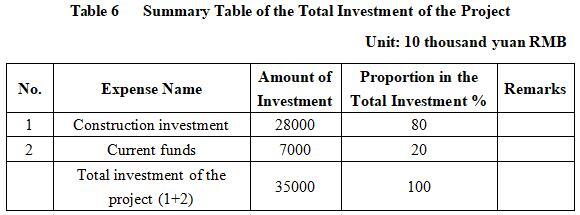
1.3.2 Capital raising
Self-funded by enterprises
1.4 Financial analysis and social evaluation
1.4.1 Main financial indexes
After the project reaches the production capacity, its annual sales income will be 200 million yuan, its profit will be 54 million yuan, its investment payback period will be 8.5 years (after the tax, including the construction period of 2 years) and its investment profit rate will be 15.4%.
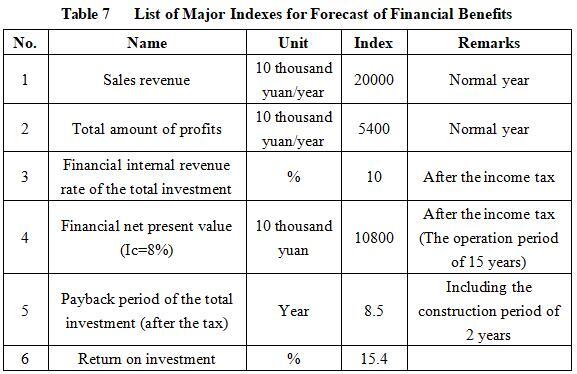
Note: “10 thousand yuan” in the table is in RMB.
1.4.2 Social evaluation
After the project is completed, it can be applied to a variety of scenarios such as translation connection, tourism, urban service, etc. among scenic areas, and can realize various functions such as connection, sightseeing, logistics, patrol, cleaning, medical security, among others, helping Meihekou City to build a city of all-region tourism scenic area.
1.5 Cooperative way
Joint venture and cooperation, other ways are negotiable.
1.6 What to be invested by the foreign party
Funding, other ways are negotiable.
1.7 Construction site of the project
Meihekou City, Jilin Province.
1.8 Progress of the project
Foreign investment attraction.
2. Introduction to the Partner
2.1 Basic information
Name: Meihekou High-tech Industrial Development Zone Management Committee, Jilin Province.
Address: No. 555, Kangmei Avenue, Guangming Street, Meihekou City, Tonghua City, Jilin Province.
2.2 Overview
The predecessor of Jilin Meihekou High-tech Industry Development Zone is Meihekou Economic and Trade Development Zone established in February 2002, covering an area of 5 square kilometers. In December 2019, it was identified as a provincial high-tech zone by the provincial government with a total planning area of 29.82 square kilometers. In the provincial-level development zone comprehensive evaluation, it ranked first in the province, and second in 2020. It has successively won the titles of “National Torch Meihekou Modern Traditional Chinese Medicine Industry Base,” “Jilin Province Pharmaceutical High-tech Industry Base and Pharmaceutical Health Industry Special Park,” “Jilin Province High-tech Industrial Cluster Area,” “National Best Investment Environment Industrial Park,” and “China's Most Promising Industrial Park.”
Meihekou Hi-tech Zone has deeply implemented the “4+3” industrial system, and planned the industrial development layout of “Five Parks, One City, One Center”. It has built pharmaceutical health industry parks, health food industry parks, modern logistics industry parks, construction and supporting industry parks, chemical industry parks, special medical food cities, and Northeast Asia nut distribution centers. Leading industry enterprises, such as Sihuan Pharmaceutical, Buchang Pharmaceutical, Tianheng Pharmaceutical, Lunan Pharmaceutical, Luzhou Laojiao, and Transfar Logistics, have been successfully introduced. Since the “13th Five-Year Plan”, the total investment in fixed assets has reached 42 billion yuan, and the number of registered enterprises has increased to 3,778. It has successively won the honorary titles of National Torch Program Traditional Chinese Medicine Characteristic Industrial Base, Industrial Park with the Best Investment Environment in China, and Industrial Park with the Most Development Potential in China, ranking top 2 in the comprehensive strength evaluation of development zones in the province for four consecutive years. In 2023, the total production value of large-scale enterprises reached 10.33 billion yuan, accounting for 77.9% of the city's total production value.
2.3 Contact method
Postal code: 135000
Contact Person: Zhang Yizhen
Tel: +86-13630716007
Email: mhxqjhj@163.com
Contact method of the city (prefecture) where the project is located:
Contact unit: Meihekou City Prefecture Bureau of Commerce
Contact Person: Mu Zhanyuan
Tel: +86-15643552255
+86-435-4326686
Email: 4965278@qq.com


